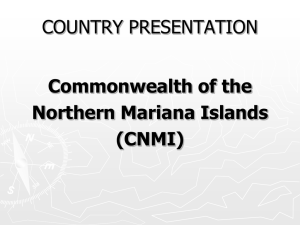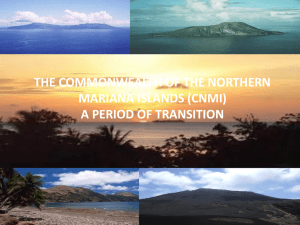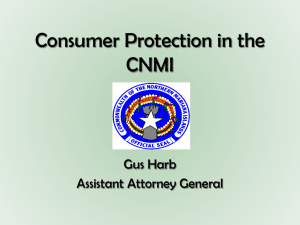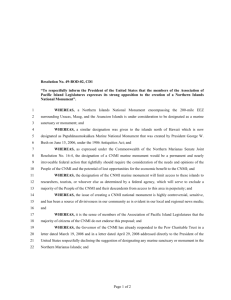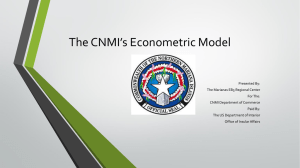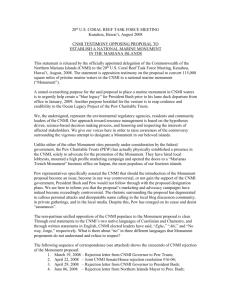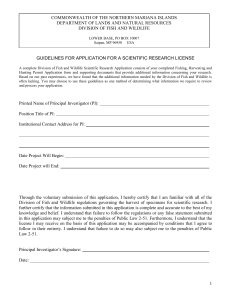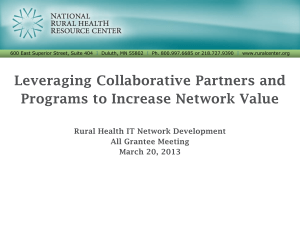Northern Marianas College
advertisement
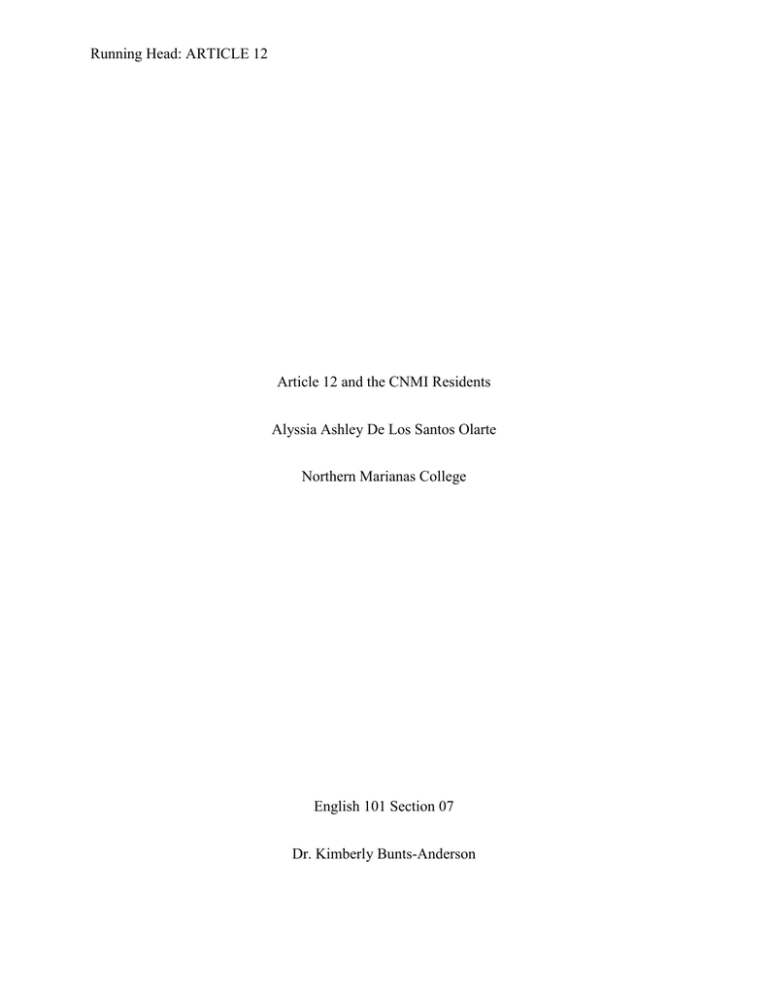
Running Head: ARTICLE 12 Article 12 and the CNMI Residents Alyssia Ashley De Los Santos Olarte Northern Marianas College English 101 Section 07 Dr. Kimberly Bunts-Anderson Article 12 2 Table of Contents Abstract ........................................................................................................................................... 3 Article 12 and the CNMI Residents ................................................................................................ 4 Literature Review............................................................................................................................ 4 Methods........................................................................................................................................... 5 Results ............................................................................................................................................. 6 How Does the CNMI Land Tenure Differ From Other Countries? ................................................ 8 How Will Opening Article 12 Benefit the CNMI? ......................................................................... 9 Conclusion .................................................................................................................................... 10 References ..................................................................................................................................... 11 Appendix ....................................................................................................................................... 14 Article 12 3 Abstract Over the years, politicians and residents have been arguing about the controversial topic of Article 12. While most agree that the law was created for the protection of the indigenous people, others argue it is a hindrance for future economic development. This paper explains the pros and cons of having Article 12 open for residents regardless of ethnicity and compromising by setting a small percentage of land up for purchase. By doing online research, information such as land ownership comparisons of the CNMI and other countries along with benefits of having foreigners come in and purchase land helped weigh the outcome of the essay question which asks if Article 12 should have people born and raised in the NMI own land regardless of ethnicity or blood. Through this essay, one will uncover the history of the NMI as well as how the land ownership of Article 12 differs from other countries. Article 12 4 Article 12 and the CNMI Residents Article 12 is said to be a" drag and anchor holding back any meaningful and long-term economic growth in the commonwealth", words said by Guam Chamber of Commerce Chairman Gerald S. A. Perez. The Constitution of the Northern Mariana Islands contains a law, Article 12, that states only NMI descendents with 25% or more of Chamorro or Carolinian blood are allowed to purchase land. The law has been a controversial topic for politicians for said bloodlines are diluting and the percentages are decreasing. In addition, the law seems unfair for other residents whom were born and raised in the islands. The main question is "Should Article 12 have people who were born and raised in the NMI own land regardless of ethnicity and blood?" Through researching articles online, reading books about the history of the NMI, surveying groups of people with different ethnicity, and interviewing experts on the topic, Article 12 is a law set out to protect the rights of the indigenous people of the Northern Mariana Islands. However, with the rise of local residents that are non-NMI descent, the Northern Mariana Islands should change the law set to having locals regardless of ethnicity require land or overall change the law and allow anyone to purchase the law. With the topic of change, the youth of the Northern Mariana Islands either full heartedly agree or acclaim to be neutral. Literature Review With Article 12 being a controversial topic, politicians have been debating back and forth on what to do with the law. Through online research, Torres (2012) and Nevitt (2005) both explain the history of the CNMI and how the law came about. However, Torres (2012) explained the thought of how NMI refuses to be like Guam and have culture die out while Nevitt (2005) explains his point while being objective. Economy wise, researchers have gathered information on the rise and fall of tourism and garment factories in the CNMI (Nevitt, 2005; Demise of last Article 12 5 three garment factories on Saipan, 2009). Nevitt (2005) gives an overview of the situation while the other goes into detail with interviews of Richard Pierce, Special Assistant to the Governor for Trade Relations and Economic Affairs. With these different authors explaining about the Article 12 law, history, and economy, Guam Chamber of Commerce Chairman, Gerald S. A. Perez, stated how Article 12 is holding back the CNMI and that "Article 12 denies serious investors not only from Guam but also from other countries the freedom to maximize the use of real property" (Rabago, 2013). The authors have done their own research, which was objective, whether they are explaining information, or re-stating what another expert said, the work was efficient. Methods On top of literature review, the process of attaining new information was time consuming. From setting a schedule and abiding by that schedule, interesting information popped up. The first week after the assignment was given was dedicated to research. Spending time in the library gave some information about the history of the Northern Mariana Islands and how the constitution came about. With that was also research on how other countries dealt with land ownership. The second week was dedicated on pilot and final drafts of surveys. The group that was targeted was mostly young adults for they are the future. The pilot study was meant for peers to make comments to help the student make improvements. For the survey, the student researcher used a reliable online survey generator called surveymonkey.com. Questions included demographics such as gender, age, nationality, country of birth, and number of years residing in the CNMI. Some questions were about asking the participant about owning land in the CNMI or other countries and how important land ownership is to them. Article 12 6 The third and fourth week were meant for interviews. Among the people who were meant to be interviewed, only one accepted and went through with the interview: NMI history teacher of Mount Carmel School Rosiki Camacho. Having contacted him and pushed for the interview, he accepted and scheduled a meeting. Results From the surveys given, majority of the people aspired for change and would not mind altering or abolishing the law. According to the survey, there were 10 questions and 61 recipients who answered (See Appendix A). Among them were about 34 females and 34 males. Majority of the recipients who answered were mixed ethnicity but only about 27 people were qualified as NMI descent (See Appendix A1). On the other hand, 29 out of the 61 recipients stated they own land outside of the CNMI (See Appendix A6). Most of the people valued their land and refused to change the law. However, based from the surveys, 60% of the people agreed to have Article 12 either open to residents of the CNMI or did not mind if the law was changed to have residents regardless of ethnicity (See Appendix A2). In addition, 62% of the recipients also agreed in putting a small amount of land up for purchase from foreigners and non-NMI descents (See Appendix A4). Majority of the questions asked were about the recipient's opinions and beliefs. One question specifically asked what they would want to change about the law. One person answered "I would abolish that constitutional provision altogether. The blood quantum provision has been vague from the beginning, and it is hurting the economy by preventing long-term investors"(See Appendix8). Another recipient answered, "I wouldn't want to change it. It is fair to those who want to sell their share of land or all of it. To those who marry and have kids with off islanders, well it's their decision on how they want the future generation to hold that responsibility whether they want to lease it or sell it to others" (See Appendix 8). In contrast to Article 12 7 answers for the change of Article 12, one who cannot own land supported article 12 by stating, "No. They made that law to preserve the land for its native people. I, myself, cannot own land" (See Appendix 8). Though many answered for the alteration of the law, a small percentage fought for the law to remain, it is meant to protect the NMI indigenous people. Along with the surveys, an interview with Mount Carmel Schools NMI history teacher, Mr. Rosiky Camacho, was conducted. He stated, "It does not matter about the quantum vote; if you can prove that you are an NMI descent, then good" (See Appendix B). The quantum vote explains that article 12 is done with its 25 years and can be put up to vote by the people. In this case, the vote to have the law changed to people having "somewhat" NMI descent (Nevitt, 2005). He stated that in the beginning, during the German Era, George Fritz did not allow foreigners to own land. Camacho explained how land was used to sustain family living back then. People were attached to the land because that was all they had (See Appendix B). Camacho stated, "If you take a fisherman out of the ocean, he cannot fish. If you take a farmer away from the land, he cannot farm" (See Appendix B). Camacho then stated how he is better off standing on his own land than renting an apartment. In addition to this, he stated that Article 12 "is kind of like a safe guard" for the people. A landowner can get monthly payments from renting or leasing his land compared to selling it overall and just having a onetime payment. One concern that Camacho did state is that it is unfair for a person who is born and raised in the CNMI and developed an attachment with the land but cannot fully own the land vs. a person of NMI descent but resides in another country with no interest of coming home, whatsoever. Camacho stated, "To resolve this, why not open the law and allow people to own in different direction"(See Appendix B). Camacho gave his honest opinion and stated the pros and cons of having Article 12 open to residents or foreigners to own land. Article 12 8 How Does the CNMI Land Tenure Differ From Other Countries? The CNMI requirements, as stated in Article 12 of the constitution ("Commonwealth Code", 2013), to purchase and own land is to be a US citizen, 25% or more of CNMI Chamorro or Carolinian blood, or adopted by a local before the age of 18. Foreigners are not allowed to purchase land, however they are allowed to lease it. Philippines require a natural-born citizen of the country to own any land, as stated in Article 12 Section 7-8 ("1987 Constitution", 1987). Foreigners cannot own land unless joint with a married partner who is a Filipino citizen or purchasing not more than 40% of shares in a condominium or town house constituted under the condominium principle with Condominium Certificates of Title Deeds (Collingz, 2011). Unlike Philippines, The United States appears more lenient. Stated in the United States Homestead Act and Desert Land Act (Seitzinger, 2013, p. 13), American citizenship or intention of citizenship is required for foreigners to acquire land. Locals, on the other hand, simply require US citizenship and state residency to acquire land. The CNMI goes by real property fee simple ("Property in CNMI", 2007) which states the owner has complete control of the land. With that, the CNMI does not enforce property tax. Philippines, however, enforces residential tax which consists of 20% of the market value of the land (Castillo, 2013). Tax rates, which are calculated with the land market value, can be either province real property of 1% interest rate or city and municipality in Metro Manila Real Properties, which consists of 2% interest rate. Payments of property tax could be paid in full or in quarterly installments (Castillo, 2013). Unlike Philippines' tax calculations, the United States calculations for property tax are the taxable assessment multiplied by the tax rate ("How Property Taxes Are Calculated", 2011). Since taxable assessment deals with the levy of local government, property tax varies by state. However, all 50 states offer some type of property tax Article 12 9 relief program which can lock in the assessed value of the property once a certain age is reached, or deferral of taxes until the owner dies or moves ("Taxes by State", 2013). Property tax in the United States is paid annually, the exact day of those payments vary with the state. Although the Philippines and the United States both enforce taxes, the amount and payments of those taxes vary with the country and/ or state. How will opening article 12 benefit the CNMI? Repealing Article 12 will attract business investors and owners to purchase land in the CNMI plus create establishments that will help increase the islands economy. The law states that only NMI descents are allowerd to own land, however, non-NMI descents are allowed to be leased the land for a certain amount of years. With the CNMIs low wages, tax, and power bill, most businessess declare bankruptcy. The lowest Gross Domestic Product of the CNMI was in 2009 with a -18.8% decline from 2008 (CNMI Department of Commerce: Economic Strategic Planning, 2013). That year was also the same year the last of 34 garment factories shut down (Demise of last three garment factories on Saipan, 2009). Knowing investors and owners can buy land and have complete control of that land will attract more tourists to the CNMI and increase our economy (Northern Mariana Islands - International tourism, n.d.). "The result of combination of factors, including security guaranteed by the US flag, the prospering Asian economy, favorable tax and immigration laws, and seemingly unregulated access to land, tourists from Asia (primarily Japan) began to travel to the CNMI and investors wanted to capitalize on the budding industry." (Nevitt, 2005). If business and tourism increase, employment rates would significantly increase. During the years, population and unemployment rates increased but declined after the year 2009. It is said that around the year 2000, the employment rate of the CNMI reached 14% then decreased to 8% by the year 2005 (Northern Mariana Islands - Unemployment Rate - Historical Data Graphs Article 12 10 per Year, n.d.) By the year 2012, the employment of CNMI increased yet again to 11.20% (Central Intelligence Agency, n.d.). With Article 12 repealed, business will come in leading to an increase in tourism, job opportunities, and population. Conclusion With the research, surveys, and interview with Rosiky Camacho, there is a greater understanding of the Article 12 law and how it affects the CNMI and the residents. Article 12 states that only NMI descents with 25% or more Chamorro or Carolinian blood are allowed to purchase land. After research about the pros and cons of opening the land to the public, the results remain balanced. The research question "Should Article 12 have people who were born and raised in the NMI own land regardless of ethnicity and blood?" remains objective. Sixty percent of the recipients agreed to allow residents regardless of ethnicity to own land. With that, 62% of the recipients agreed to put a small amount of land for foreigners to purchase as a beginning step of change. In contrast to the law, Rosiky Camacho stated that the law is somewhat a safeguard for the NMI descents. What is needed is compromise. Land ownership varies with countries. The Philippines only allows Filipino citizens to purchase land with an exception of condominiums. The United States allows foreigners to own land but with special requirements while residents only needs to prove their residency. Having Article 12 altered to having residents and foreigners contributes many benefits and is more favorable among the young adults. Article 12 11 References Castillo, C. (2013, January 5). What You Need To Know About Real Property Tax (RPT). Retrieved from http://www.foreclosurephilippines.com/2013/01/real-property-tax-rptphilippines.html Commonwealth Code, Commonwealth Law Revision Commission Saipan, MP ArticleXII. (2013). Commonwealth Law Revision Commission. Retrieved from http://cnmilaw.org/articlexii.html Collingz, B. (2011, August 12). PLC International Marketing Networks: Philippine Constitutional Property Ownership Laws. Foreign Nationals beware of buying land properties. [Web blog post]Retrieved from http://plcinternationalmarketingnetworks. blogspot.com/2011/08/philippine-constitutional-property.html CNMI Department of Commerce: Economic Strategic Planning. (June, 2013). [Presentation Slides]. Retrieved from http://www.frbsf.org/community-development/files/SixtoIgisomar-CNMI-Dept-of-Commerce-6-4-2013.pdf Demise of last three garment factories on Saipan. (January, 2009).Retrieved from http://www.radioaustralia.net.au/international/radio/onairhighlights/demise-of-last-threegarment-factories-on-saipan How property taxes are calculated. (2011, October 14). Department of Taxation and Finance. Retrieved from http://www.tax.ny.gov/pit/property/learn/ Nevitt, Brooke E. (2005, August). Consequences of Good Intentions Exploring Land Rights in The Commonwealth of the Northern Mariana Islands. Retrieved from University of Hawaii Library website: Article 12 12 http://scholarspace.manoa.hawaii.edu/bitstream/handle/10125/11785/uhm_ma_3244_r.pd f?sequence=2 Northern Mariana Islands - International tourism. (n.d.). Northern Mariana Islands. Retrieved from http://www.indexmundi.com/facts/northern-mariana-islands/international-tourism Northern Mariana Islands - Unemployment Rate - Historical Data Graphs per Year. (n.d.). Northern Mariana Islands - Unemploymet Rate - Historical Data Graphs per Year. Retrieved, from http://www.indexmundi.com/g/g.aspx?c=cq&v=74 Property in Commonwealth of Northern Mariana Islands | Commonwealth of Northern Mariana Island Real Estate Investment. (2007, July 17). Global Property Guide. Retrieved from http://www.globalpropertyguide.com/Pacific/Commonwealth-of-Northern-MarianaIslands Rabago, M. (September 06, 2013). Perez to Saipan Chamber: "Land Alienation Provision Holding Back CNMI Economy". Pacific News Center . Retrieved from http://www.pacificnewscenter.com/index.php?option=com_content&view=article&id=37 492:video-perez-to-saipan-chamber-qland-alienation-provision-holding-back-cnmieconomyq&catid=45:guam-news&Itemid=156 Seitzinger, M. (2013, June 17). Foreign Investment in the United States: Major Federal Statutory Restrictions [Electronic mailing list message]. Retrieved from http://www.fas.org/sgp/crs/misc/RL33103.pdf Taxes by State. (2013, January). Retrieved from https://www.retirementliving.com/taxes-%20bystate Article 12 13 The 1987 Constitution of the Republic of the Philippines- Article XII. (1987, February 11). Official Gazette . Retrieved from http://www.gov.ph/the-philippineconstitutions/the-1987-constitution-of-the-%20republic-of-the-philippines/the-1987constitution-of-the-republic-of-the-philippines-article-xii/ Torres, N. M. (2012). Self-Determination Challenges to Voter Classifications in the Marianas After Rice v. Cayetano: A Call for a Congressional Declaration of Territorial Principles. Asian-Pacific Law & Policy Journal. Vol. 14:1. 160-165. Retrieved from http://blog.hawaii.edu/aplpj/files/2013/01/APLPJ_14.1_Torres_vFINAL2.pdf Article 12 14 Appendices Article 12 15 Appendix A This explains the answers received from the surveys. A1 Article 12 A2 A4 16 A3 A5 Article 12 A6 A8 17 A7 Article 12 18 Article 12 19 Appendix B Here is the audio recording of the interview with Mr. Rosiky Camacho.
